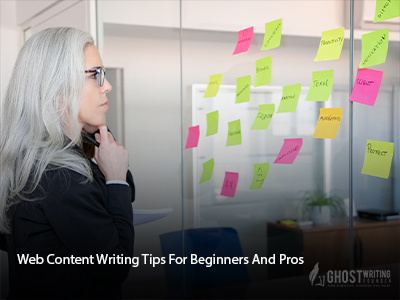
Writing
Regardless of your reason to pursue web content writing, you would want to leave a deep and great impression on your readers through your content.
Whether you are a web content beginner or a pro, you would definitely want to improve your website content writing to engage more readers. Eventually, you would want to convert those website visitors into your clients.
In this blog post, we will look at how you can improve your website content writing and achieve your goals in a short period. Here’s a great thing about this post, and that is, you will learn more from other people’s failures and mistakes. In this prospect, learning from others’ mistakes will help you achieve your targets in no time because you will not be making those mistakes when starting your career in website content writing.
If you are already a pro and believe this blog post is targeted at beginners, my friend, you are mistaken. After all, you want to impress your readers, correct? In that case, go through this blog post to check if you are not making these mistakes in your
Web Content Writing Tips for Beginners and Pros
Regardless of your reason to pursue web content writing, you would want to leave a deep and great impression on your readers through your content.
Whether you are a web content beginner or a pro, you would definitely want to improve your website content writing to engage more readers. Eventually, you would want to convert those website visitors into your clients.
In this blog post, we will look at how you can improve your website content writing and achieve your goals in a short period. Here’s a great thing about this post, and that is, you will learn more from other people’s failures and mistakes. In this prospect, learning from others’ mistakes will help you achieve your targets in no time because you will not be making those mistakes when starting your career in website content writing.
If you are already a pro and believe this blog post is targeted at beginners, my friend, you are mistaken. After all, you want to impress your readers, correct? In that case, go through this blog post to check if you are not making these mistakes in your website content writing.
To begin with,
What is Website content writing?
It’s a type of writing that targets a specific audience, the ones who land on the website. The more relevant the content for the readers, the better the conversion rate for the business. At times, web content includes specific keywords used on the website to answer the customer’s search query. Your customer can visit a website for several reasons:
1. To buy a product or compare
2. To search for a keyword for a better understanding
3. To search for the product or services
4. To improve their existing knowledge about something
5. To enhance their quality of life
6. To learn and research
7. To entertain themselves
8. To help themselves perform better in their current setting: office, home, institution.
Irrespective of your customers’ reasons, you want your visitors to become your recurring clients. For that, you should be asking this question: how can we help the visitors achieve their goals and targets so they start doing business with us?
The very first thing you should be doing is to improve the existing content on your web. When you help the readers and visitors reach their goals through your web content writing skills, they trust you. If you can fulfill the visitor’s needs, then you can become a successful writer. But what do you need to do to achieve that?
Bear the following pointers in your mind. If you can convince your readers, you can provide the best services or have the best product on the market. You’d know that the customer is not going anywhere. When you successfully persuade your readers about your service, then you can reach your goals and flaunt your website content writing skills for future opportunities.
Strategies for Effective Website content writing Development:
Develop Content as per Your Client Needs:
One of the biggest mistakes people make in website content writing is that they miss a great opportunity to talk about their business and how their business can help solve the customers’ problems and concerns. Believe it, many, along with thousands of people who don’t want to know about how great the product is or how best your services are.
The customers are only concerned about what the product can do for them and how it can help them reach their goals and targets. When you can steer away from the customers’ gloomy clouds, you gain their trust. No matter if it is your products or the services you offer, developing website content that is powerful, relevant, and engaging for the readers does wonder for you.
Inculcate keywords in your content, not some sentences in your keywords:
Website content writing includes SEO strategies such as Keyword inculcation for the better visibility and ranking of the website on the search engine. However, a mediocre-level web content writer may fall victim to this naïve game of keywords. Your goal should be to use keywords in your content according to the search engine’s analytics and density criteria.
Here comes the good news: Google now penalized the extra use of keywords in the content.
Trust me, that has been one of the best things that ever happened. Keyword stuffing does not leave a good impression on your readers. Regardless of your level of expertise, there are times when we commit this sin of adding the keywords without placing any cap on them. There should be a limit to it. Good website content is not adding keywords but rather answering the customers/visitors’ search intent. Make your content accordingly.
Make your Paragraphs Vary in Length
According to behavioral psychology, people lose their attention in around 8-9 seconds. Your goal should be to make your website content in a way that keeps your readers engaged. How can you gain their attention? Well, you gain their attention by varying your sentence length, including the paragraph length. This way, you can remove the heavy and thick block of text, equating it with a content piece that is easy to scan. The simpler the content, the better it is for the readers.
Make your content Scan-able:
Expounding on the above-mentioned statement, your website content writing should include different elements like bullet points, headers, subheads, numbers, paragraphs, and illustrations. Anything that makes your content readable and scan-able is best for your readers. For example:
• Bullet pointers help readers digest content in one go.
• Likewise, they make your content look structured, organized, appealing, and consistent.
• Remember, the better the readability of your web content, the more conversions.
Don’t Offer Services all the time:
Call-to-actions are important for your products and services sales and marketing, but you wouldn’t want to oversell them. To understand this better, consider this hypothetical scenario:
Suppose you run into an emergency room because you cut your finger with a sharp knife. You would want your finger to be treated immediately.
You go into the ER; you realize that instead of treating your finger, your nurse starts selling you pills for fever. (That’s not going to happen, hopefully) but you would be angry, right?
You might want to say, “Lady, I have a bleeding finger that needs to be treated. I don’t need any pills.”
The same is your website visitors’ feelings when you try to oversell rather than listen to people’s needs.
Don’t make your customers open up a dictionary:
Avoid, avoid, and avoid complex, convoluted, and complicated words in your content. Using words that your readers don’t know, such as jargon and specific technical vocabulary, makes your readers feel dumb. You don’t want them to feel bad about their linguistic quality. Rather you should make them feel smart and happy. Dumbing down your content is a big no-no area where you shouldn’t go. Keep your language as simple as it can be to make your readers welcomed. Remember: if you are going to make them open up a dictionary, make sure it is for a good cause.
Use the inverted Pyramid Method.
With the digital fluff and clutter, your readers might just want to read a sentence or two to decide whether they want to continue their readings. Make that first impression worth a while. How? Use the inverted pyramid strategy that has been used for over a century now by the Print Media. That is, give the most important and relevant information first. The rest will follow to explain your content further.
Answer to 5Ws (What, Where, Who, When, Why) and 1 H (How) question in your website content. Because the clearer information the readers have about you, the more times they will come back for more. Applying this strategy, you can also create attention-grabbing headlines that your readers can’t resist ignoring. Here’s how your inverted pyramid should look like:
Do your research
You can increase your website content writing credibility by showing your research skills. Include relevant statistics or cite resources that can display your power to learn from others. Whether it is a number or a client testimonial, anything that can show your human side is appreciated. No one wants to deal with a hardcore mechanic person who is devoid of human feelings. This will also help to stop making empty promises.
Borrow information and rewrite them if need be, but create authenticity in your content. To avoid plagiarism, use Grammarly or Copyscape software that helps your check plagiarism in your content. This leads us to the last and the final important point for the website content writing strategy.
Edit, Edit and Edit your web content.
Everyone needs an editor to check their mistakes and catch their errors. Even if you become a pro in website content writing, you may want to hire an editor for fact-checking, accuracy, flow, consistency, and grammar and syntax errors. Editors are the second in command of your writing piece. They help you formulate a strong and effective piece that passes the readability test and helps the customers in the decision-making process. After all, your visitor has come to your website; you don’t want them to leave without buying from you.
The Bonus Tip: Call-to-action.
In website content writing, your goal is to assist the customer in the buying journey process. No matter if they are comparing prices plan or deciding to buy from your competitors, you don’t want to miss the opportunity to engage them. How can you engage them in your content? They get engaged through the call-to-action part. Effective call-to-actions help you achieve:
• Make a purchase
• Build a strong connection with your customers
• Make your brand memorable
• Track your ROI
• Increase your subscribers
• Generate new visitors lists for emails
• Content Marketing
Where can you add call-to-action in your website content writing?
• While adding a discount coupon
• Sharing content on social media
• Helping someone in the scheduling or booking consultation
• On the landing pages
• In between the blog sections
• Providing contact details for email sign up
• In Giveaways such as free eBooks, templates, research papers, white papers, or other resources.
• For downloading paid resources
Essential Elements and Detailed Insights
| Element | Description | Impact on Web Content |
|---|---|---|
| Understanding Audience Needs | Identifying the specific needs and interests of the website’s target audience. | Tailors content to meet user expectations, enhancing engagement and conversion rates. |
| Incorporating SEO Strategies | Using SEO techniques such as keyword integration to improve visibility on search engines. | Increases website traffic and relevance in search results, attracting a broader audience. |
| Content Structuring | Varying paragraph lengths and using elements like bullet points, headers, and subheads. | Makes content more readable and scannable, holding the reader’s attention. |
| Clear and Simple Language | Avoiding complex jargon and keeping the language straightforward. | Ensures content is accessible and understandable to a wider audience, enhancing readability. |
| Engaging and Relevant Writing | Developing content that addresses the customers’ problems and offers solutions. | Builds trust with the audience by providing value and relevant information. |
| Effective Use of CTAs | Strategically placing Call-to-Actions to guide user interaction. | Encourages user engagement and directs them towards desired actions like purchases or sign-ups. |
| Research and Credibility | Incorporating researched facts and statistics to add authenticity. | Enhances the credibility of the content and the website, building trust with the audience. |
Conclusion:
These important points aren’t an exhaustive list. When you combine these with other effective strategies, you will notice drastic changes in your website content writing. Your visitors will increase, which will help you convert them into clients. Let us know what works best for you. We’ll be happy to hear your feedback. Likewise, if you are interested in learning more about how we can help you achieve your website content writing goals, contact us.









Leave a Reply